Eric Garner death: Fresh protests across US cities
- Published
Watch: How the protests unfolded in a number of US cities
Protests have been held for a second night over the death of a black man held in an apparent chokehold by a white New York police officer.
Thousands of people took to the streets in New York and other US cities, disrupting traffic and holding sit-ins.
The protests began on Wednesday, after a grand jury decided not to press charges over the death of Eric Garner.
Civil rights activists are pinning their hopes on a federal investigation into the case.
New York City mayor Bill de Blasio: "People need to know that black lives and brown lives matter as much as white lives"
The mayor of New York, Bill de Blasio, said the city's 22,000-strong police force would be retrained in how to better communicate and remain calm when making arrests, and they will be fitted with body cameras.
US President Barack Obama welcomed the mayor's commitment to act, adding: "Too many Americans feel deep unfairness when it comes to the gap between our professed ideals and how laws are applied on a day to day basis."
America saw a wave of race-related unrest only last week over the decision not to indict another white police officer who had shot dead a young black man, Michael Brown, in Ferguson, Missouri.
UN human rights experts have expressed "legitimate concerns" over the decisions not to bring to trial the cases of both Mr Brown and Mr Garner.

13%
of the US population is black
-
28% of suspects arrested in the US in 2010 were black
-
32% of people killed from 2003 to 2009 in arrest-related incidents were black
-
42% of inmates on death row in 2012 were black
'Black life matters'
On Thursday night in New York, protesters carried coffins across the Brooklyn Bridge and marched in several groups through Manhattan, carrying banners saying "Racism kills" and "This stops today".
"People are sick and tired of the systemic problems of racism in this country," said one protester, Jason Pollock. "We are out here in the streets to say that black life matters."
Police in riot gear told protesters staging sit-ins that they would face arrest if they did not move along. Police arrested more than 80 people in Wednesday's protests, though the demonstrations have been largely peaceful.
The woman who filmed Eric Garner being held called the decision not to prosecute a 'slap in the face'
Smaller-scale protests were held in cities including Chicago, Washington, Denver, and Boston. In Minneapolis, some protesters blocked traffic by marching or lying in the middle of a highway.
Activists have called for another march in Washington on 13 December, followed by a summit on civil rights.
Mr Garner, 43, was stopped on a street in New York on 17 July on suspicion of selling loose, untaxed cigarettes.
After a confrontation with police officer Daniel Pantaleo placed his arm round Mr Garner's neck. Mr Garner, who had asthma, was wrestled to the ground and restrained by force.
On video of the incident, he can be heard repeatedly saying "I can't breathe". He became unresponsive and later died.
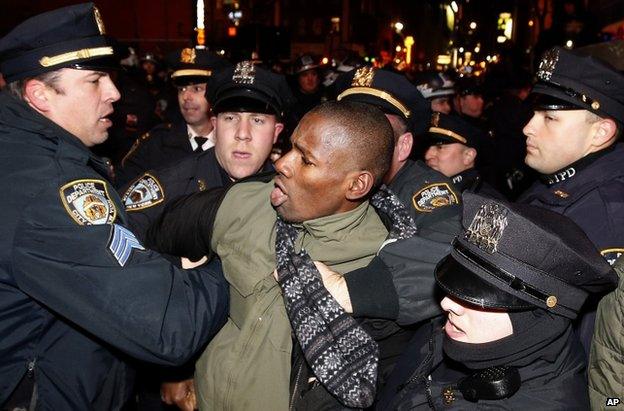
Police make an arrest at a protest in Midtown, New York, early on Friday
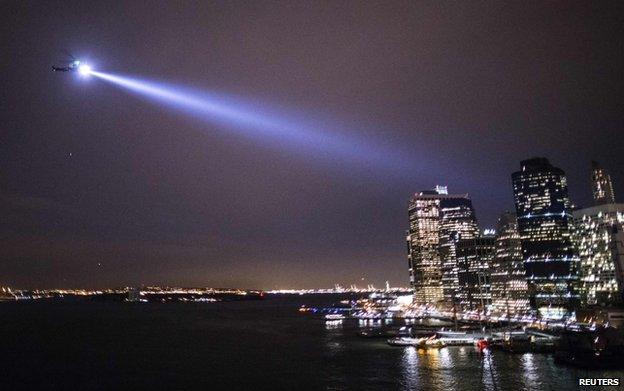
A police helicopter shines a search light towards marchers near New York's Brooklyn Bridge
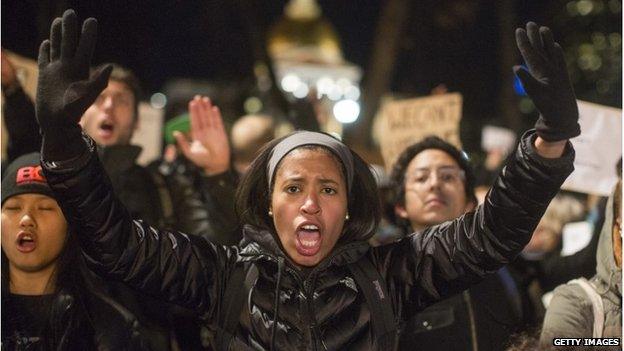
Washington was one of the other cities to see demonstrations
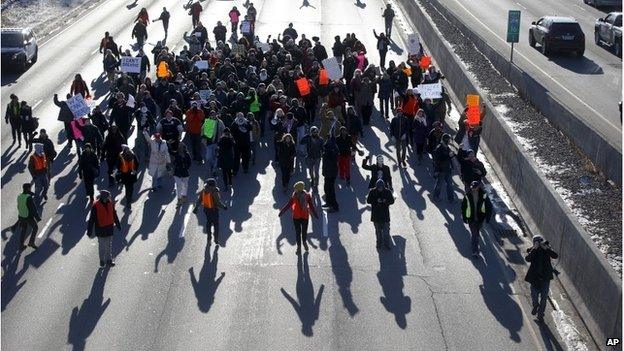
In Minneapolis, protesters marched down an interstate highway
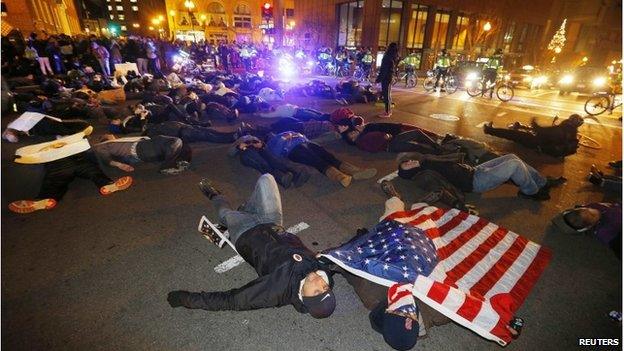
Protesters in Boston staged a "die-in"
The city's medical examiner's office found in the summer that Mr Garner's death was caused by "the compression of his chest and prone positioning during physical restraint by police".
Police unions and Mr Pantaleo's lawyer, Stuart London, have said he used an accepted takedown manoeuvre on Mr Garner, rather than a chokehold, which is banned under New York City police regulations.
Mr Pantaleo testified to having heard Mr Garner say "I can't breathe" but said he had believed that once he got him down on the ground and put him on his side, he would be revived by paramedics, according to Mr London.
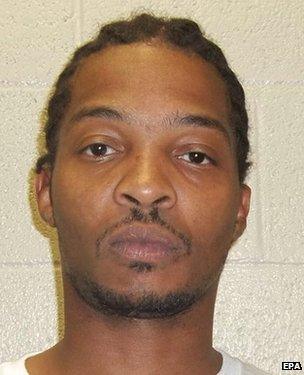
An Arizona prison service handout photo of Rumain Brisbon, shot dead this week
Mr Pantaleo also testified that he had tried in vain to talk Mr Garner into complying with police instructions - something not seen on the video. "Let's make this easy, you've been through this before," the police officer is said to have told Mr Garner.
Attorney General Eric Holder promised "an independent, thorough, fair and expeditious" federal investigation into potential civil rights violations in the case.
A review of how to heal a "breakdown in trust" between police and communities is also under way.
Elsewhere in the US several other racially sensitive cases appeared this week:
In Phoenix, Arizona, protesters demonstrated after a white police officer shot dead a black suspected drug-trafficker, after apparently mistaking a pill bottle in his pocket for a gun on Tuesday
In South Carolina, white ex-police chief Richards Combs was charged with murder over the 2011 shooting of an unarmed black man, Bernard Bailey
The justice department and the city of Cleveland, Ohio, agreed to overhaul city police after federal investigators found, external frequent use of excessive force caused deep mistrust, especially among black people.